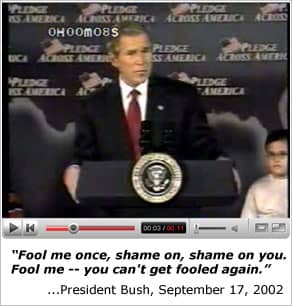Fool Me Once: Bush and Iran
As the debate over Iran's involvement in attacks on U.S. forces in Iraq heats up, the Bush White House is facing a credibility gap of historic proportions. Four and a half years after mangling the old saying himself, President Bush's Iran saber-rattling is suffering from the same "Fool Me Once" syndrome he bungled in September 2002:
"There's a lot of talk about Iraq on our TV screens, and there should be, because we're trying to figure out how best to make the world a peaceful place. There's an old saying in Tennessee -- I know it's in Texas, probably in Tennessee -- that says, fool me once, shame on -- shame on you. Fool me -- you can't get fooled again." [Click here for video.]
As it turns out, the incredulity of the American people is shared by many within the Pentagon and the Bush administration itself. On February 2nd, National Security Advisor Stephen Hadley (who had blessed the infamous 16 words in Bush's ill-fated 2003 State of the Union), acknowledged that the public case against Iran was held back because it was "overstated" and not "focused on the facts." New CentComm commander William Fallon declared "I have no idea who may be actually with hands-on in this stuff." And even as a third American carrier battle group prepares to steam to the Persian Gulf, Joint Chiefs Chairman Peter Pace rejected any authoritative conclusion that the government in Tehran ordered the weapons shipments described by anonymous U.S. military briefers. (Their Powerpoint presentation is available here.) During a visit to Australia, Pace told the Voice of America:
"We know that the explosively formed projectiles are manufactured in Iran. What I would not say is that the Iranian government, per se, knows about this. It is clear that Iranians are involved, and it's clear that materials from Iran are involved, but I would not say by what I know that the Iranian government clearly knows or is complicit."
The JCS chairman's posture on the dubious evidence for meddling by the Ahmadinjed government created problems almost immediately for the White House. Press Secretary Tony Snow was grilled at Tuesday's briefing by CNN's Ed Henry (among others), who pointedly asked, "Are you saying that you, from this podium, know more than the Chairman of the Joint Chiefs of Staff?" Under withering assault over the briefer's assertion Saturday that "the highest levels of the Iranian government" approved the weapons transfers, Snow could only muster:
"Do we have a signed piece of paper from Mr. Khamenei or from President Ahmadinejad signing off on this? No. But are the Quds Forces part of the army - part of the government? The answer is yes. So the question is, I think this ends up being a semantic dispute about senior levels of the government or the government. And the fact is, the government knows about it."
Snow's semantic battles are only the tip of the iceberg for a Bush White House facing global skepticism over its claims of Iranian involvement in Iraq. For starters, U.S casualties in Iraq are overwhelmingly due to attacks from Sunni insurgents and Al Qaeda fighters, not the Mehdi Army of Shia cleric Muqtada Al Sadr supposedly being armed by Iran. (U.S. briefer claimed that 170 Americans were killed by Iranian manufactured "explosively-formed penetrators" first pioneered by its client Hezbollah in Lebanon.) More puzzling, the evidence suggests that the Iranians are arming both Al Sadr and the U.S.-backed Supreme Council for Islamic Revolution in Iraq or SCIRI. The head of SCIRI and leader of the largest Shiite faction in the Maliki government, Abdul-Aziz al-Hakim, met with President Bush at the White House in December 2006.
Over at the Washington Monthly, Kevin Drum concurs with Leila Fadel of the McClatchey Newspapers that "the evidence of Iranian meddling in Iraq...is far more compelling than much of the administration's pre-war intelligence about Iraq." But Drum continues, "Still, everyone is skeptical, and who can blame them?"
After all, fool me once, shame on you. Fool me twice, shame on me. And to paraphrase President Bush and the Who, we won't get fooled again.



That quote is one for the ages. I'm surprised we haven't seen that video clip over and over this week.